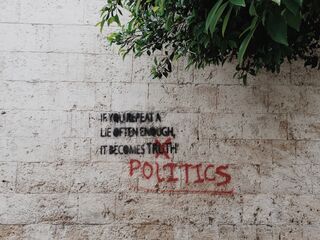Ethics and Morality
Why We Believe Lies, and How to Resist
We all avoid facing the lies in our midst and embracing the truth.
Posted June 5, 2021 Reviewed by Devon Frye
Key points
- It's easy to think that only others are susceptible to lies.
- The search for truth and rejection of lies begins with ourselves.
- We should become passionate about finding truths that matter to us.

The French philosopher Yves Simon offers an incisive observation about the prevalence of lies in human social groups:
"I do not know, I cannot imagine, any group which does not include among its current ideas an enormous dose of lies. That being the case, the alternative is inevitable: either one must like falsehood, or one must dislike the familiar setting of daily life."1
Simon's claim reminds one of the lyrics of "Lies," a song by the Violent Femmes, which decries the lies of poets, televangelists, and everyone in the government. While I think the claims of both Simon and the Femmes are overstated, they are nevertheless onto something important. There might not be an enormous dose of lies in every human group, but I suspect there is a pretty healthy one in most of them.
What can be done about this?
As Zena Hitz observes in Lost in Thought, we often ascribe lies to them, rather than us. It's the rich, the Democrats, the poor, or the Republicans that are captured by lies: "We pretend that others are indeed swallowed by lies, but we ourselves have escaped. We imagine that our social class or group allows us special access to truth. Accordingly, our focus on truth and falsehood must begin with ourselves."2
First, if we are to heed Hitz's advice, we must accept the truth that we ourselves believe many lies. This is to be expected, given the fact that human beings are fallible. None of us believes only what is true. But that doesn't mean that we can't increase our stock of true beliefs, while reducing the number of falsehoods we embrace.
Second, we must accept the truth that one reason we continue to believe many lies is that it brings us comfort. When we accept that we ourselves are under the power of many lies, the social comfort of being part of the right group, the group that knows truth, we may feel vulnerable, and we will certainly feel some discomfort. But it is worth trading, as Hitz puts it, "social consolations for truth and dignity."3
Third, as Hitz notes, we can escape the lies by seeking out simplicity, in many different practices. Anything from beekeeping to prayer to walks in the woods to immersion in the intellectual life. I think there is value in this. It is not enough to escape the lies, we must also seek out truth.
We cannot know the truth about everything, for a variety of reasons. Yet we can choose to pursue truth in a few select areas of life, find truth about things that ignite a passion within us, things that we want to learn about for their own sake. We seek such truths not for the sake of status, power, influence, or wealth, but because they have intrinsic worth for us. In this way, we can cultivate an interior life that is not only resistant to lies, but one that also embraces truths we find to be worthwhile. Then we can embrace the familiar setting of our daily lives, and choose how to invest our time and energy in the wider struggle for truth, for both our personal and the common good.
References
1. Yves Simon, "Freedom in Daily Life", in Freedom and Community, ed. Charles P. O'Donnell (New York: Fordham, 1968), 5-6. Quoted in Lost in Thought, Zena Hitz (Princeton University Press, 2020), 83-84.
2. Lost in Thought, Hitz, 83.


